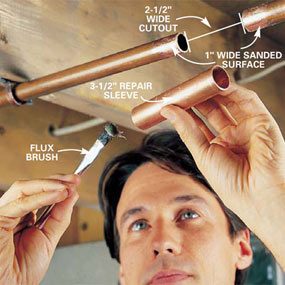Here you can find all the home heating tips you need, to make your life easier. From bleeding a radiator to fixing leaky copper pipes.
We all depend heavily on our home heating for our comfort, so you may find these tips helpful along the way. If you like reading about these tips, we'd be delighted to receive your feedback.
8 Home Heating Tips to Make Your Life Easier – Bleed a Radiator to Fixing Leaky Copper Pipes
As the temperatures drop and winter inches closer, ensuring your home stays warm and comfortable becomes a top priority. However, managing your home's heating system can sometimes feel overwhelming, especially when unexpected issues arise. Whether you're a seasoned DIY enthusiast or prefer leaving tasks to the professionals, these eight home heating tips will help make your life easier. From bleeding a radiator to fixing leaky copper pipes and protecting your home against harsh winter weather, we've got you covered.
1. Bleed Your Radiators Regularly
One of the simplest yet most effective ways to maintain your heating system is by bleeding your radiators. Over time, air can become trapped inside, preventing hot water from circulating efficiently. This not only reduces the effectiveness of your heating but can also lead to increased energy bills.
Steps to Bleed a Radiator:
- Turn Off the Heating: Ensure your heating system is off and the radiators are cool to the touch.
- Locate the Bleed Valve: This is typically found at the top of the radiator, often on one side.
- Use a Radiator Key: Insert the key into the bleed valve and slowly turn it counter-clockwise.
- Release the Air: You’ll hear a hissing sound as the trapped air escapes. Once only water starts to seep out, tighten the valve.
- Check the Pressure: After bleeding, check your boiler’s pressure gauge and top it up if necessary.
When to Seek Professional Help
If you find that you’re repeatedly bleeding your radiators or noticing inconsistent heating, it might be time to consult a professional. Persistent issues could indicate underlying problems with your heating system that require expert attention.
Call to Action: Contact our Heating Experts Today to schedule a comprehensive check-up and ensure your radiators are functioning optimally.
2. Fix Leaky Copper Pipes
Leaky pipes not only waste water but can also lead to significant damage and increased heating costs. Copper pipes are commonly used in heating systems, and while they are durable, they can develop leaks over time.
How to Fix a Leaky Copper Pipe:
- Turn Off the Water Supply: Locate the main water shut-off valve and turn it off to prevent further leakage.
- Drain the System: Open faucets to drain any remaining water from the pipes.
- Locate the Leak: Identify the exact spot where the leak is occurring.
- Clean the Area: Use sandpaper to clean the area around the leak, ensuring a good surface for repair.
- Apply Pipe Sealant or Wrap: For minor leaks, apply a copper pipe clamp or wrap the area with self-fusing silicone tape.
- Replace the Section (if necessary): For more significant leaks, you may need to cut out the damaged section and replace it with a new piece of copper pipe using appropriate fittings.

Preventing Future Leaks
Regular maintenance can help prevent future leaks. Inspect your pipes periodically for signs of wear or corrosion and address any issues promptly.
Call to Action: Schedule a Pipe Inspection with our qualified technicians to ensure your copper pipes are in excellent condition.
3. Insulate Your Home Properly
Proper insulation is crucial for maintaining a warm home during winter. It prevents heat from escaping and keeps cold air out, ensuring your heating system works efficiently.
Key Areas to Insulate:
- Attic and Roof: Heat rises, so ensuring your attic is well-insulated can significantly impact your home’s warmth.
- Walls and Floors: Insulating walls and floors can prevent heat loss and maintain a comfortable indoor temperature.
- Windows and Doors: Use weatherstripping or thermal curtains to minimize drafts and heat loss around windows and doors.
Insert Image: Diagram showing proper insulation of a home.
Choosing the Right Insulation Material
There are various insulation materials available, each with its own benefits. Common options include fiberglass, cellulose, and foam insulation. Consult with a professional to determine the best material for your home’s specific needs.
Call to Action: Get a Free Insulation Assessment to find out how you can improve your home’s insulation and reduce heating costs.
4. Maintain Your Boiler Regularly
Your boiler is the heart of your home heating system. Regular maintenance ensures it operates efficiently, prolongs its lifespan, and reduces the risk of breakdowns during the coldest months.
Boiler Maintenance Checklist:
- Annual Servicing: Have a professional inspect and service your boiler at least once a year.
- Check for Leaks: Regularly inspect your boiler and surrounding areas for any signs of water leaks.
- Bleed Radiators: As mentioned earlier, bleeding radiators helps maintain boiler efficiency.
- Monitor Pressure Levels: Ensure the boiler pressure remains within the recommended range, typically between 1 and 1.5 bar.
- Clean the Boiler Area: Keep the area around your boiler clean and free from obstructions to ensure proper airflow.
Insert Video: Boiler maintenance tips from our experts.
Signs Your Boiler Needs Attention
Be aware of warning signs such as unusual noises, inconsistent heating, or an unexplained increase in energy bills. Addressing these issues promptly can prevent more serious problems down the line.
Call to Action: Book a Boiler Service with our certified technicians to keep your heating system running smoothly all winter long.
5. Upgrade to a Programmable Thermostat
A programmable thermostat can significantly enhance your home’s heating efficiency by allowing you to set specific temperatures for different times of the day.
Benefits of a Programmable Thermostat:
- Energy Savings: Reduce heating costs by lowering the temperature when you’re not home or asleep.
- Convenience: Automatically adjust settings without manual intervention.
- Improved Comfort: Maintain a consistent temperature that suits your daily routine.
Insert Image: Modern programmable thermostat interface.
Smart Thermostats for Enhanced Control
 Consider upgrading to a smart thermostat, which offers additional features like remote control via smartphone apps, learning your schedule, and providing energy usage reports.
Consider upgrading to a smart thermostat, which offers additional features like remote control via smartphone apps, learning your schedule, and providing energy usage reports.
Call to Action: Explore Our Smart Thermostat Options and take control of your home’s heating with ease.
6. Seal Gaps and Cracks
Even the smallest gaps and cracks around windows, doors, and walls can let in cold air, making your heating system work harder to keep your home warm.
How to Seal Gaps and Cracks:
- Inspect Your Home: Walk around your home and identify any gaps or cracks, especially around windows and doors.
- Choose the Right Sealant: Use caulk for smaller cracks and weatherstripping for door frames and windows.
- Apply the Sealant: Carefully apply the sealant to the identified areas, ensuring a tight seal.
- Check for Drafts: After sealing, feel for any remaining drafts and address them as needed.
Insert Image: Before and after sealing gaps around a window.
Benefits of Proper Sealing
Sealing gaps not only improves heating efficiency but also enhances overall energy efficiency, leading to lower utility bills and a more comfortable living environment.
Call to Action: Schedule a Home Sealing Service to ensure your home is airtight and energy-efficient.
7. Utilize Space Heaters Wisely
Space heaters can be an effective way to heat specific areas of your home without relying solely on the central heating system. However, they should be used safely and efficiently to avoid unnecessary energy consumption.
Tips for Using Space Heaters:
- Choose Energy-Efficient Models: Look for space heaters with high energy efficiency ratings to minimize electricity usage.
- Positioning: Place heaters in the rooms you use most frequently and away from flammable materials.
- Safety Features: Select models with automatic shut-off features to prevent accidents.
- Limit Usage: Use space heaters to complement your central heating, not replace it entirely.
Insert Video: Proper use and safety tips for space heaters.
Types of Space Heaters
There are various types of space heaters available, including:
- Convection Heaters: Provide steady, long-lasting heat by circulating warm air.
- Radiant Heaters: Offer instant heat by directly warming objects and people in their line of sight.
- Oil-Filled Heaters: Retain heat for longer periods, making them suitable for prolonged use.
Call to Action: Browse Our Amazon Selection of Safe and Efficient Space Heaters to find the perfect fit for your home.
8. Protect Your Home from Winter Weather
Winter weather can pose various challenges to your home’s heating system. Taking proactive steps to protect your home can prevent damage and ensure your heating system remains effective.
Winter Protection Tips:
- Insulate Pipes: Prevent frozen pipes by insulating them, especially those in unheated areas.
- Clear Gutters: Ensure gutters are free from debris to prevent ice dams and water damage.
- Check the Roof: Inspect your roof for any damage that could lead to leaks during heavy snowfall.
- Prepare for Power Outages: Keep a supply of blankets, flashlights, and a battery-powered radio in case of emergencies.
- Trim Trees: Remove any dead branches that could fall and cause damage during storms.
Insert Image: Snow-covered home with properly insulated pipes.
Emergency Preparedness
Having a winter emergency plan can make a significant difference in how you cope with unexpected weather events. Make sure your family knows what to do in case of a heating system failure or power outage.
Call to Action: Get Your Home Winter-Ready with our comprehensive winter protection services.
Bonus Tip: Regularly Inspect and Replace Filters
If your heating system uses filters, such as in forced-air systems, it’s essential to inspect and replace them regularly. Dirty filters can obstruct airflow, forcing your system to work harder and reducing its efficiency.
Filter Maintenance Steps:
- Locate the Filter: Find where your filters are housed within your heating system.
- Remove and Inspect: Take out the filter and check for dirt and debris accumulation.
- Clean or Replace: Depending on the filter type, either clean it according to the manufacturer’s instructions or replace it with a new one.
- Record Replacement Dates: Keep track of when you last replaced or cleaned the filters to ensure regular maintenance.
Insert Image: Clean vs. dirty air filters in a heating system.
Choosing the Right Filter
Select filters that are compatible with your system and meet your household’s specific needs, such as high-efficiency filters for improved air quality.
Call to Action: Order Replacement Filters today and ensure your heating system remains clean and efficient.
Get a Professional Boiler Service Done Annually
I would suggest bringing in a licensed service professional once a year to perform a complete inspection and conduct annual maintenance work. This trained and certified technician should rigorously test the boiler and repair problems, clean the heat exchanger, check connections and wiring, and test water pH levels.
Prompt and professional installation of your new gas boiler. Warranty and post warranty service, annual maintenance plans and boiler repairs. Wall boiler type latest systems are up to 95% efficient. A flue wall mount gas-fired condensing boiler featuring an innovative vertical mounted, helical fin tube heat exchanger is an example.
For every year a boiler system goes unattended, boiler costs can increase approximately 10%. Boiler operation and maintenance is therefore a good place to start when looking for ways to reduce energy use and save money.
You will do best to hire the most experienced boiler installation service that can do the best job. These professionals are fully expert to provide you the best boiler installation or repair at a very affordable cost.
Prepare Your Home For Winter
A boiler repair or maintenance is very important whether it is summer or winter.
Most homeowners keen to keep their home heating running smoothly often do a basic check their HVAC system in advance.
Power outages can occur in subzero temperatures. Power outages are never convenient, so make sure you have a back-up method of lighting a fire or stove to keep warm in at least one part of your home. During subzero winter weather, a power outage can be damaging and even dangerous for a home's occupants, unless you do have just one room you can keep warm using an alternative form of heating.
How to Protect Your Home from Winter Weather
Insulation not only effective to heat the home, as well as it helps to control the overall temperature inside at moderate. One of the best home heating tips is that through insulation, you can protect the leakage of the heat from the building and consider suitable for almost every weather, especially for winters.
Winter maintenance keeps your home working the way it sure during the cold weather months, protects you and your family, and ensures you’re ready for the spring thaw. The following are some things to include on this year’s winter maintenance checklist.
Home Heating Tips – Heat Pumps
The heating and cooling produced by air conditioners and heat pumps is based directly on the temperature/pressure relationship of the gas inside the system. The changing of the gas to a liquid, liquid to gas, and circulation of it is what ultimately impacts the air temperature in your home.
You may also be interested in energy cost savings from heat pumps here.
Home Heating Tips – Conclusion

Maintaining a comfortable and warm home during the winter months doesn't have to be a daunting task. By following these eight home heating tips— from bleeding a radiator and fixing leaky copper pipes to upgrading your thermostat and protecting your home from winter weather—you can ensure your heating system operates efficiently and effectively.
Regular maintenance and proactive measures not only enhance your home's comfort but also save you money on energy bills and prevent costly repairs.
At Plumber Glasgow South, we understand the challenges homeowners face when it comes to heating their homes. Our team of experienced professionals is here to help you implement these tips and address any heating issues you may encounter. Whether you need routine maintenance, urgent repairs, or expert advice on improving your home’s heating efficiency, we’re just a call or click away.
[First published on Mar 9, 2020. Updated 14 December 2024.)





